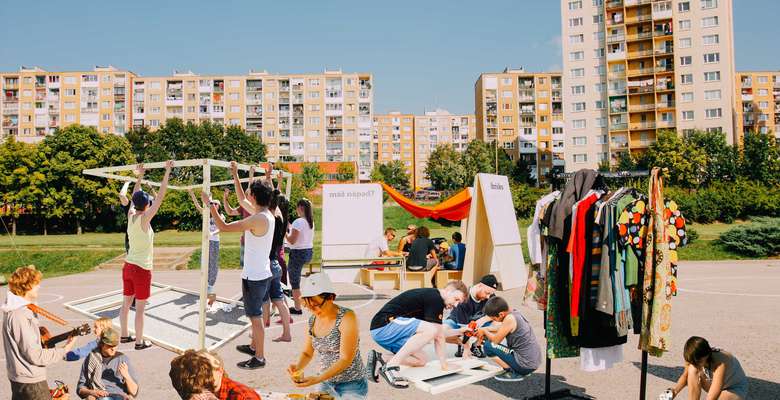Idea by
Zuzana Tabačková, Viktória Mravčáková, Zuzana Révészová
SPOLKA
Call for ideas 2017
Utopia 2.0
Utopia 2.0

The suburbs of European cities are littered with the rubble of modernist Utopia: dormitory neighbourhoods of densely inhabited housing towers and vast, anonymous public spaces. The architectural reflex is almost invariably the same: top-down, programmatic and/or physical densification. Yet another play-ground, yet another cafe. Alternatively, one-off artistic interventions may offer a fleeting moment of togetherness and collective engagement, but no model of lasting change.
A new utopia is possible – one based on a different logic of intervention, midway between the two sketched out above. If (social) space is the network effect of the interactions between humans and objects, we propose that the future of (public) architecture lies in the capacity to bring together, and coordinate, these two sets of actors. Inclusive and open-ended commoning practices constitute the most promising strategy to enable the emergence of context-sensitive, meaningful and resilient (uses of) public space.
Utopia 2.0
Utopia 2.0

The suburbs of European cities are littered with the rubble of modernist Utopia: dormitory neighbourhoods of densely inhabited housing towers and vast, anonymous public spaces. The architectural reflex is almost invariably the same: top-down, programmatic and/or physical densification. Yet another play-ground, yet another cafe. Alternatively, one-off artistic interventions may offer a fleeting moment of togetherness and collective engagement, but no model of lasting change.
A new utopia is possible – one based on a different logic of intervention, midway between the two sketched out above. If (social) space is the network effect of the interactions between humans and objects, we propose that the future of (public) architecture lies in the capacity to bring together, and coordinate, these two sets of actors. Inclusive and open-ended commoning practices constitute the most promising strategy to enable the emergence of context-sensitive, meaningful and resilient (uses of) public space.